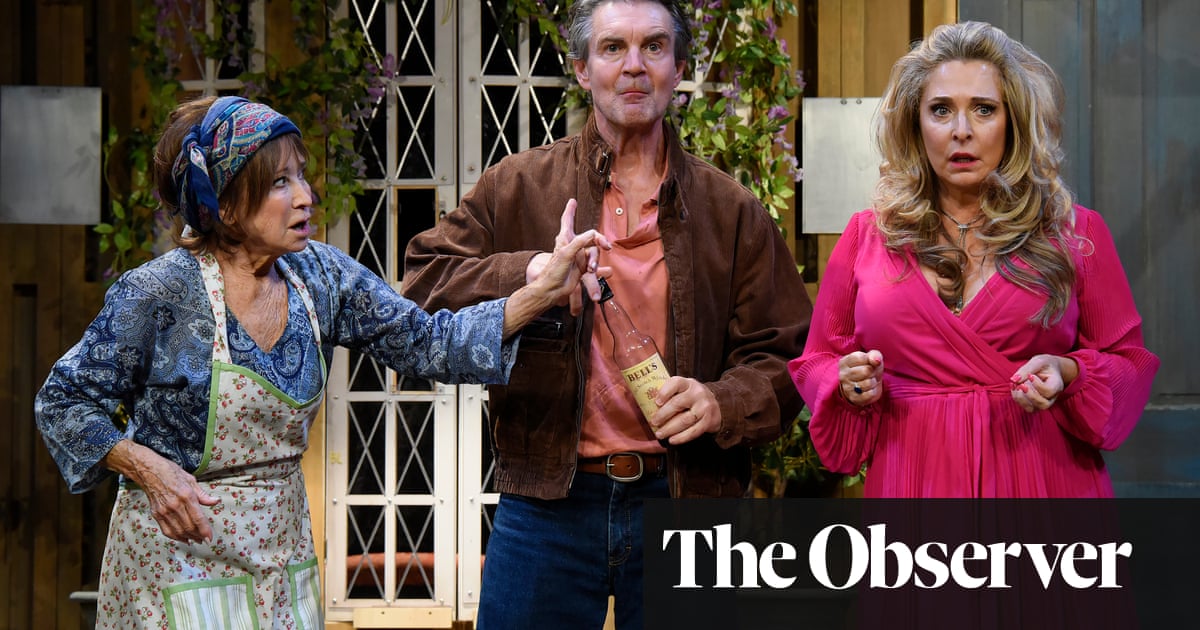
If there is one, teeny tiny upside for Rhianna Pratchett in the fact that her father is no longer around, it’s that she doesn’t have to hear what he thinks about her first novel.
“Obviously, it goes without saying that I wish he was still here,” says Rhianna. Her father, Discworld author Terry Pratchett, died in 2015. “But the tiniest silver lining is that he would have had lots of opinions about what I was doing right and wrong, and I think it would have been probably even more nerve-racking to have him read it.”
Out next week, Crystal of Storms is the latest instalment in the rebooted Fighting Fantasy books, the popular 80s and 90s adventure game series in which the reader plays the hero, battles monsters armed only with a pencil and a dice, and makes choices (fight the beast or run away; take the left fork or the right) in an attempt to survive their quest unscathed. Twenty-million copies of the game books have sold around the world since the first was published in 1982.
It is dedicated to Rhianna’s parents, “who showed me magic every day”. Terry’s opinions still pop into her mind. “I always joke about having the Ghost Dad in my head,” she says. “He would have a lot of thoughts about this, but I know he would be smiling about seeing his daughter’s name on the front of a book.”
Rhianna was asked to write a Fighting Fantasy story by the series’ co-founder Ian Livingstone, who created it with his Games Workshop collaborator Steve Jackson. Livingstone and Rhianna knew each other through the video games industry, having both worked on the Tomb Raider franchise. Livingstone, a games industry legend, launched the original game in 1996, while Rhianna was a lead writer on the 2013 reboot. “He emailed me and said, ‘Would you like to give it a go?’ I read them as a kid, and it scared me a bit, so I thought, ‘This is clearly something I must do if it’s scaring me’.”
Rhianna trained as a journalist and worked in games journalism before being hired as a script editor for the role-playing game Beyond Divinity. She loved it, and went on to work on other games including Heavenly Sword and BioShock Infinite. She was writing for a living, and telling stories, but novels were never part of the plan.
“Pratchett senior had novels pretty much sewn up, so it wasn’t something I gravitated towards,” she says. As a young child, she “basically ignored” what her father did, until Equal Rites was serialised on Woman’s Hour on BBC Radio 4, and she realised he was a pretty big deal.
“That’s when I started being interested in my father’s books as a reader, rather than particularly wanting to go into writing. I don’t think I knew what I wanted to do,” she says. “My dad maybe nudged me in the direction of journalism. He said he could always see the scaly hands of journalism reaching out to me.” He worked as a local journalist himself, and was the publicity officer for the Central Electricity Generating Board when he became a full-time writer.
Terry was “always really pleased about me doing games development and there was no suggestion that it wasn’t a proper job or anything like that”, she says. The two would play together when she was a child, with Rhianna drawing maps of the games they’d play on graph paper, or, if the game didn’t require maps, “I would tuck myself behind him in his big office chair and peek out from behind him to watch him playing, offer bits of advice.”
Even now, she plays games with him in the back of her mind; Terry enjoyed open world and survival games, so she has been playing those in lockdown. “I sometimes gravitate towards games because Ghost Dad likes them. I know that sounds slightly strange, but when you lose someone, they become a part of you, a voice in your head,” she says.
Pratchett’s Fighting Fantasy story is set on the floating islands of Pangaria, where an explosion has sent the island of Nimbus crashing into the sea. As the sole surviving member of the Sky Watch, guardians of peace on the archipelago, the reader has to try to raise Nimbus from the deep, while hunted by deadly monsters. Like all the Fighting Fantasy books, it is swashbuckling fun. “As the creatures slither over to look at you, their beautiful faces all smiles and laughter, you think you are safe,” one ending reads. “But their smiles transform into grimaces as their fangs lengthen and their skin turns black. The last thing you remember are their teeth. So many teeth … Your adventure is over.” What child – or adult – wouldn’t love that?
With every single choice made by the reader sending them down a different pathway towards a different conclusion, writing a Fighting Fantasy book is a complicated task. But Rhianna’s work on video games, she thinks, set her up perfectly. First she tried planning it freehand, as Livingstone does, then she built flowcharts. By the end, she was using acolour-coded spreadsheet to keep track of her story.
“I wrote it in a kind of linear way, and then branched out at different points and followed each branch and then came back to the main trunk of the story. And that probably felt much more familiar to me than it may for someone who’s very experienced in novel writing, but maybe not as experienced in game design,” she says. “Part of the reason I said yes to it was because I felt I wasn’t just writing a fantasy novel, I was doing something very relevant to the career I’ve had in games.”
Rhianna is also the co-director of Narrativia, a production company set up by Terry in 2012 to adapt his Discworld novels. In April, it was announced that the company would be joining forces with Motive Pictures and Endeavour Content to get the books on screens. But recently she has also shared her anger over The Watch, a controversial BBC America adaptation “inspired by” her father’s stories about Ankh-Morpork’s City Watch. When production wrapped last week, she called out the showrunner for failing to mention her father in his thank you message. “This should tell you everything you need to know,” wrote Rhianna, who is no longer involved with the show.
“I was very unhappy with Dad not being thanked,” she says, a few days later. “I don’t know why but it hasn’t been edited so it seems deliberate, unfortunately. But there we go.” Working with Motive, she says, pointedly, is about “creating things that are more faithful to the source material, because that’s very much what Dad wanted.”
As for her future, she’s not sure about writing more novels. “But I didn’t think I would end up writing a Fighting Fantasy book either. So I’m very open to possibilities.”
Fighting Fantasy: Crystal of Storms by Rhianna Pratchett is published by Scholastic on 1 October.












